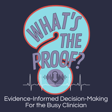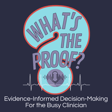
#10 It's Getting Hot In Here: Non-Hormonal Therapies for Menopausal Vasomotor Symptoms
In this episode of "What's the Proof?" we delve into non-hormonal therapies for menopausal vasomotor symptoms (VMS), commonly known as hot flashes and night sweats. Hormone replacement therapy (HRT) is the most effective treatment for VMS, but it isn't suitable for everyone. Join Bobby, Dawn, and Sandy as they explore alternative treatment options for women who cannot or choose not to use HRT. From lifestyle interventions and mind-body techniques to dietary supplements and prescription medications, we break down the latest evidence and provide practical advice for managing these disruptive symptoms. Whether you're a clinician seeking to expand your treatment toolkit or a patient looking for more information, this episode offers valuable insights into improving quality of life during menopause.
Episode Highlights:
[00:00] Introduction and Overview:
- Welcome and episode introduction by Bobby, Dawn, and Sandy.
- Discussion on the significance of VMS during menopause and the limitations of hormone replacement therapy.
[05:50] Lifestyle Interventions
- Discussion on general health benefits and specific interventions like cooling techniques, avoiding triggers, and yoga.
- Evidence review showing limited effectiveness of these methods for reducing VMS.
[10:42] Mind-Body Techniques
- Examination of Cognitive-Behavioral Therapy (CBT) and its promising results for VMS management.
- Insights into clinical hypnosis as a potential therapy.
- Brief discussion on mindfulness and paced breathing, highlighting the lack of substantial evidence for VMS relief.
[17:05] Dietary Supplements
- Analysis of the mixed results for soy products and black cohosh.
- Summary of current recommendations against these supplements due to limited efficacy.
[19:52] Acupuncture
- Discussion on the effectiveness of acupuncture versus sham acupuncture.
- Conclusion that acupuncture is not recommended for VMS treatment based on current evidence.
[21:00] Prescription Medications
- Review of SSRIs, SNRIs, and gabapentin, discussing their varying degrees of effectiveness.
- Introduction to fezolinetant (Veozah), a new neurokinin B antagonist with promising results but higher costs.
- Practical advice on prescribing these medications and considerations for patient-specific factors.
[40:00] Practical Tips and Closing Remarks
Tune in to learn:
- The specific non-hormonal options available for VMS and their effectiveness based on recent studies.
- Practical tips for incorporating these alternatives into clinical practice.
- Personal insights from our hosts on managing VMS without hormones.
Episode Links:
If you liked this episode, please share it with your colleagues, friends, and patients! Subscribe here to "What's the Proof?" on YouTube for video content, and stay updated with the latest episodes! Share your thoughts and questions with us on Twitter @theproofpodcast or email whatstheproofpodcast@gmail.com.
Credits:
- Hosts: Bobby Scott, MD, FAAFP, DABFM; Sandy Robertson, PharmD; Dawn Caviness, MD, BSN, DABFM
- Production & Cover Art: Bobby Scott, MD, FAAFP, DABFM
- Music: Twisterium, MondayHopes, Muzaproduction, and SergeQuadrado from Pixabay

